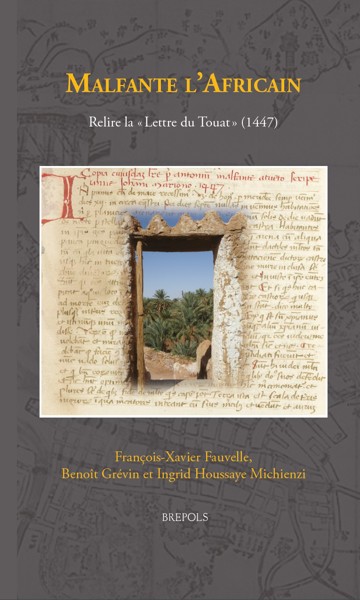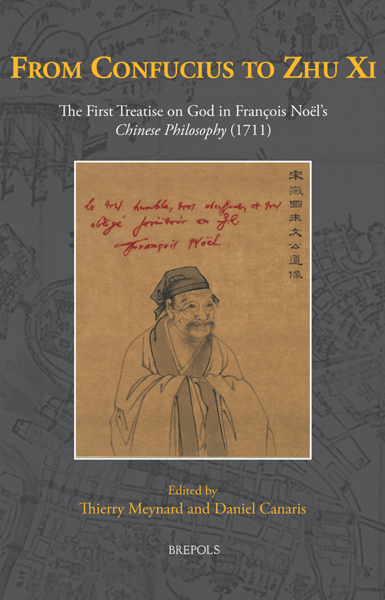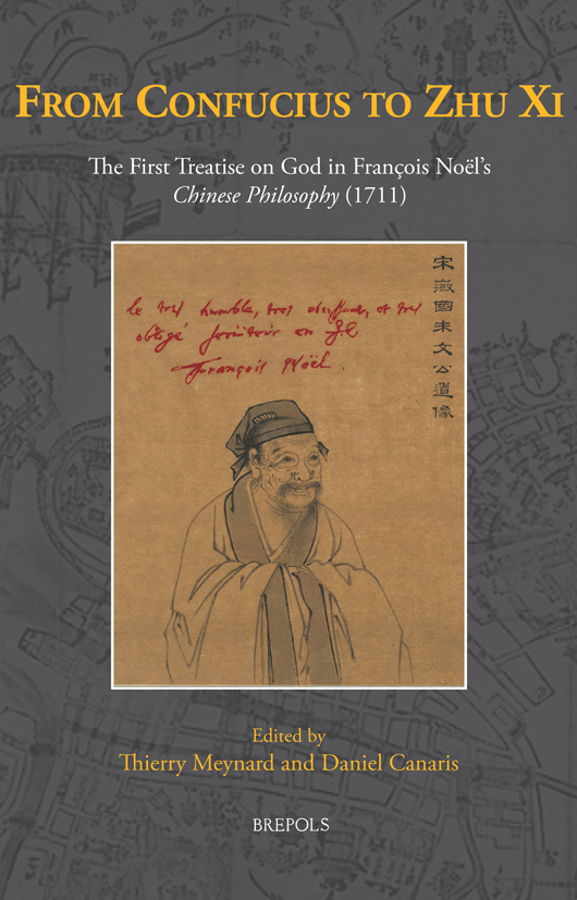
From Confucius to Zhu Xi
The First Treatise on God in François Noël’s Chinese Philosophy (1711)
Thierry Meynard, Daniel Canaris (eds)
- Pages: 432 p.
- Size:156 x 234 mm
- Illustrations:8 b/w, 8 tables b/w.
- Language(s):English
- Publication Year:2023
- € 120,00 EXCL. VAT RETAIL PRICE
- ISBN: 978-2-503-60179-3
- Hardback
- Available
- € 120,00 EXCL. VAT RETAIL PRICE
- ISBN: 978-2-503-60180-9
- E-book
- Available
“Overall, this is an extremely well-conceived and thorough book. In addition to its usefulness as a scholarly reference tool and accessible translation of an important and often overlooked text, it fully achieves the aims of the Global Perspectives on Medieval and Early Modern historiography series by providing a serious, engaging and original cross-cultural study of the historiography of the period. It will be of interest to those well beyond specialists in the field.” (Timothy Baycroft, in Archivum Historicum Societatis Iesu, 1, 2024, p. 135-136)
"For anyone interested in the question of who in the West wrote the frst book on “Chinese philosophy” and “comparative philosophy,” this book is a must-read. (...) Furthermore, for anyone interested in “Chinese speculative philosophy” and “comparative speculative philosophy,” this book is also a must-read." (Yueqiang Wu, Dao, 24, 2025, p. 177)
"The Jesuit François Noël (1651-1729), who served as a missionary in China for fifteen years, was among the very first Europeans to appreciate his Asian contemporaries as philosophers. We thus owe a tremendous debt of gratitude to Thierry Meynard, Daniel Canaris, and the fine group of scholars they have assembled for this translation of the first treatise of Noël’s Philosophia sinica (1711)." (Trent Pomplun, in Revue d'Histoire Ecclésiastique, 120/1-2, 2025, p. 399)
Thierry Meynard, S.J., is professor in the Department of Philosophy and director of the Archive for the Introduction of Western Knowledge at Sun Yat-sen University, Guangzhou. Prior book publications in English include: The Jesuit Reading of Confucius (2015), The Religious Philosophy of Liang Shuming (2011), Confucius Sinarum Philosophus (2011), and co-authored with Dawei Pan, A Brief Introduction to the Study of Human Nature by Giulio Aleni (2020), and with Sher-shiueh Li, Jesuit Chreia in Late Ming China (2014).
Daniel Canaris is a DECRA Fellow and lecturer in the Department of Italian Studies at the University of Sydney. His research focuses on Sino-Western exchange in the early modern period. After receiving his PhD from the University of Sydney in 2017, he has held fellowships in Germany, England, China and the United States. His first monograph, Vico and China, was published in the Oxford University Studies in the Enlightenment series.
On 25 September 1710, Pope Clement XI finally promulgated the 1704 decree Cum Deus optimus, which condemned the toleration of certain Confucian rituals among Chinese Catholic converts and the use of the Chinese terms tian and Shangdi to refer to the Christian God. This papal decision antagonised the Kangxi Emperor and devastated the Jesuit China mission. Although the Jesuits were prohibited from publicly refuting the decree, the Flemish Jesuit François Noël sought to defend the Jesuit position by publishing his voluminous scholarship on the Chinese classics. Among other works, in 1711 Noël published two seminal contributions to the history of Sinology: the Sinensis imperii libri classici sex or Libri sex, and the Philosophia Sinica, a sophisticated treatment of Chinese metaphysics, ritual, and ethics. While the Libri sex achieved some degree of influence in the Enlightenment through the French translation of the French Jesuit historian Du Halde and the writings of the philosopher Christian Wolff, the Philosophia Sinica was actively suppressed by the Superior-General of the Jesuit order. Yet it is in this latter work where the full breadth of Noël’s originality and intellectual contribution can be found. Noël reinterprets the Jesuits’ position through the lens of Neo-Confucianism, integrating concepts such as li, taiji, yin, and yang in his reading of Chinese philosophy. With contributions from Sinologists and intellectual historians, this book offers the first systematic study of this pioneering work.
List of Illustrations
Preface
Introduction
Thierry Meynard and Daniel Canaris
1. Intellectual Biography of François Noël
Yves Vendé
2. Composition and Sources of the First Treatise
Thierry Meynard
3. Noël’s Interpretation of Neo-Confucianism
Thierry Meynard
4. Evaluation from the Perspective of Chinese Philosophy
Wang Ge
5. Theological Themes in the First Treatise
Pierre Galassi
François Noël’s Chinese Philosophy in Three Treatises
Preface to the Reader
First Treatise: On Chinese Knowledge of the First Being, or God
Chapter 1: Did the Ancient Chinese have Knowledge of God, the First Being, or were they Atheists?
Question 1: How many Meanings does Tian Have in the Ancient Books?
Question 2: What Perfections do the Ancient Classics Attribute to Tian and Shangdi?
Question 3: Whether the Ancient Books and Classics Give True Knowledge of the First Being, or God, and whether it is False that the Ancient Chinese were Atheists
Chapter 2: Do Modern Chinese People Have Knowledge of the First Being or God, or Are they Atheists?
Question 1: What Perfections do the Modern Commentators Attribute to Tian or Shangdi?
Question 2: How Do Modern Authors Explain Tian, and Do they Distinguish Tian from Shangdi?
Question 3: What Do Modern Commentators Recognize as First Origin of the World?
Question 4: Definitions, Types, and Properties of the Spirits by Modern Authors
Question 5: What does jiaoshe or the Sacrifice to Heaven and Earth Mean?
Question 6: What does the Two-Character Word taiji or First Ultimate of Things Mean among the Chinese?
Question 7: Do Modern Works Give True Knowledge of the First Being or God, and Are Modern Chinese Atheists?
Chapter 3: True Name of God in China
Question 1: Can God be called Shangdi, that is the Lord and Ruler of Heaven, or Supreme Lord?
Question 2: Can God be Called Tian (Heaven)?
About the Authors
Bibliography
Concordance List of Titles and Names
Charts
Index

